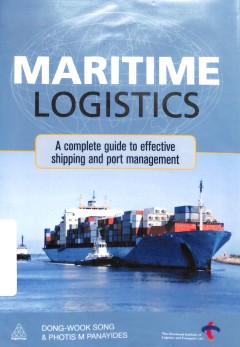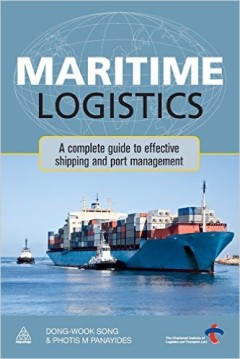Ditapis dengan

The effect of shipping knowledge and absorptive capacity on organizational in…
Abstract Purpose – The purpose of this paper is to examine what types of shipping knowledge are crucial in order for shipping companies to survive in dynamic business environment, and to investigate how the shipping knowledge affects the company’s performance (i.e. organizational innovation and logistics value). This paper also diagnoses the moderating effect of absorptive capacity on the …
- Edisi
- The International Journal of Logistics Management
- ISBN/ISSN
- -
- Deskripsi Fisik
- 22 halaman
- Judul Seri
- The effect of shipping knowledge and absorptive capacity on organizational innovation and logistics value
- No. Panggil
- ATC MG EON a

Maritime logistic : a complete guide to effective shipping and port management
Current globalization and borderless operations in manufacturing are creating a greater demand for international transportation and supply chain logistics. Maritime (shipping and ports) is one of the key components in this business pattern. It is now estimated that approximately 90% of global trading freight moves by ship. As this trade increases it is becoming more important to have a clear un…
- Edisi
- -
- ISBN/ISSN
- 978-0-7494-63694
- Deskripsi Fisik
- xiv, 326 p., 24 cm ; index
- Judul Seri
- -
- No. Panggil
- LC 388.04 SON m

Global supply chain and port/terminal: integration and competitiveness
Much has been said of the importance of port and terminal integration in the supply chain. Authors have stressed the importance of agility to the port environment, which involves being proactive along supply chains, facilitation of intermodal integration, as well as organizational integration and partnership between ports and users. Despite the well articulated importance of the issues, littl…
- Edisi
- VOL. 35, NO. 1, 73–87
- ISBN/ISSN
- 1464–5254
- Deskripsi Fisik
- 16 p.
- Judul Seri
- Maritime Policy & Management: The flagship journal of international shipping and port research
- No. Panggil
- ATC LO SON g

Defining maritime logistics hub and its implication for container port
Since the hub-and-spoke concept was introduced to the aviation market after the US airline deregulation in the late 1970s, it becomes a primary distribution model employed by leading international logistics companies. This pattern drives the companies to consolidate shipments on the large scale at major terminals (i.e. hub) and to redistribute the smaller scale of shipments to their respective …
- Edisi
- VOL. 38, NO. 3, 269–292
- ISBN/ISSN
- 1464–5254
- Deskripsi Fisik
- 25 p.
- Judul Seri
- Maritime Policy & Management: The flagship journal of international shipping and port research
- No. Panggil
- ATC LO NAM d

An Application of DEA Windows Analysis to Container Port Production Efficiency
There have been various analyses of the efficiency of container port (or terminal) production using Data Envelopment Analysis (DEA) based on cross-sectional data. When time is not considered, the efficiency results derived using this approach can be biased. In order to overcome this problem, this paper applies DEA windows analysis, utilising panel data, to a sample of the world’s major contai…
- Edisi
- Vol.3, Issue 2 – June 2004
- ISBN/ISSN
- 184-206
- Deskripsi Fisik
- 24p
- Judul Seri
- Review of Network Economics
- No. Panggil
- ATC LO CUL a

A stochastic frontier model of the productive efficiency of Korean container …
A central objective of port privatization and/or deregulation policies is stimulating greater efficiency by engendering a more competitive market and commercial approach to management. Korea provides a prime example of a nation that is implementing such policies. Also, its ports play a pivotal role in world shipping, particularly in the ever-burgeoning container market. The success of these pol…
- Edisi
- 2003
- ISBN/ISSN
- 1466–4283
- Deskripsi Fisik
- 18p
- Judul Seri
- Applied Economics
- No. Panggil
- ATC LO CUL a

A stochastic frontier model of the efficiency of major container terminals in…
This paper applies a ‘port function matrix’ to analyse the administrative and ownership structures of major container ports in Asia. The relative efficiency of these ports is then assessed using the cross-sectional and panel data versions of the ‘stochastic frontier model’. The estimated efficiency measures are broadly similar for the two versions of the model tested. From the results o…
- Edisi
- 2002
- ISBN/ISSN
- -
- Deskripsi Fisik
- 21p
- Judul Seri
- Transportation Research Part A
- No. Panggil
- ATC LO CUL a

Container terminals in South Korea: problems and panaceas
Korea has achieved remarkable economic growth over the last three decades. This has largely been due to the adoption of export-oriented economic policies. This economic development has resulted in a rapid increase in export and import cargoes. Since the foreign trade of Korea is carried predominantly by sea transport (approximately 99.8% in terms of volume), ports play a crucial role in this pr…
- Edisi
- Vol 25
- ISBN/ISSN
- -
- Deskripsi Fisik
- 19 p.
- Judul Seri
- Maritime Policy & Management
- No. Panggil
- ATC LO CUL c
Maritime logistics : contemporary issues
- Edisi
- -
- ISBN/ISSN
- 978-1-78052-340-8
- Deskripsi Fisik
- vii, 289 p.; 21 cm
- Judul Seri
- -
- No. Panggil
- LO SON m
- Edisi
- -
- ISBN/ISSN
- 978-1-78052-340-8
- Deskripsi Fisik
- vii, 289 p.; 21 cm
- Judul Seri
- -
- No. Panggil
- LO SON m

Maritime Logistics: A Complete Guide to Effective Shipping and Port Management
Current globalization and borderless operations in manufacturing are creating a greater demand for international transportation and supply chain logistics. Maritime (shipping and ports) is one of the key components in this business pattern. It is now estimated that approximately 90% of global trading freight moves by ship. As this trade increases it is becoming more important to have a clear un…
- Edisi
- -
- ISBN/ISSN
- 978-0-7494-6369-4
- Deskripsi Fisik
- xiv, 326p. ; 24cm.
- Judul Seri
- -
- No. Panggil
- LO SON m

The technical efficiency of container ports: Comparing data envelopment analy…
The efficiency of the container port industry has been variously studied utilising either Data Envelopment Analysis (DEA) or Stochastic Frontier Analysis (SFA). Given the strengths and weaknesses associated with these two approaches, the efficiency estimates and scale properties derived from these analyses are not always convincing. This paper applies both approaches to the same set of containe…
- Edisi
- -
- ISBN/ISSN
- -
- Deskripsi Fisik
- 22 p.
- Judul Seri
- Transportation Research Part A Policy and Practice
- No. Panggil
- ATC LO JIE t

Port governance in Korea: revisited
Since the previous paper of us (Song & Lee, 2007), Korean ports, like others in the region and world, have experienced a number of challenges, which have driven the ports to make either a slight adjustment or a substantial re-organisation in terms of their governance structure. This paper aims to examine such drivers and subsequent changes taken place in Korea since 2007. This line of analysis …
- Edisi
- -
- ISBN/ISSN
- -
- Deskripsi Fisik
- 11 p.
- Judul Seri
- -
- No. Panggil
- ATC PO WOO p

Regional container port competition and co-operation: the case of Hong Kong a…
As the entrep^ot to the Chinese mainland, the economy of Hong Kong has enjoyed a high growth rate of economic development. When Hong Kong developed its container ports in order to accommodate the regional economic boom, its counterparts in China were left far behind; there was no serious port competition from China. However, as China develops its economy, the port of Hong Kong faces real challe…
- Edisi
- -
- ISBN/ISSN
- -
- Deskripsi Fisik
- 12 p.
- Judul Seri
- Journal of Transport Geography
- No. Panggil
- ATC LO WOO r

Evaluating the integration of seaport container terminals in supply chains
The purpose of this paper is to define and empirically develop measures to evaluate the extent of integration of seaport container terminals in supply chains.
- Edisi
- Vol. 38 No. 7, 2008 pp. 562-584
- ISBN/ISSN
- -
- Deskripsi Fisik
- 26 p.
- Judul Seri
- International Journal of Physical Distribution & Logistics Management
- No. Panggil
- ATC LO WOO e

Maritime logistics as an emerging discipline
The evolution of maritime logistics as an emerging discipline has resulted, to a large extent, from the increasing and varied demands of shippers and customers and the rapidly changing role of ports in the context of supply and logistics chains. Scholars are becoming increasingly aware of the need to integrate logistics and supply chain management concepts in the maritime transportation chain a…
- Edisi
- Vol. 40, No. 3, 295–308
- ISBN/ISSN
- -
- Deskripsi Fisik
- 16 p .
- Judul Seri
- Maritime Policy & Management
- No. Panggil
- ATC LO WOO m

The effect of shipping knowledge and absorptive capacity on organizational in…
The purpose of this paper is to examine what types of shipping knowledge are crucial in order for shipping companies to survive in dynamic business environment, and to investigate how the shipping knowledge affects the company’s performance (i.e. organizational innovation and logistics value). This paper also diagnoses the moderating effect of absorptive capacity on the relationship between t…
- Edisi
- Vol. 26 No. 2, 2015
- ISBN/ISSN
- -
- Deskripsi Fisik
- 22 p.
- Judul Seri
- The International Journal of Logistics Management
- No. Panggil
- ATC LO WOO t
 Karya Umum
Karya Umum  Filsafat
Filsafat  Agama
Agama  Ilmu-ilmu Sosial
Ilmu-ilmu Sosial  Bahasa
Bahasa  Ilmu-ilmu Murni
Ilmu-ilmu Murni  Ilmu-ilmu Terapan
Ilmu-ilmu Terapan  Kesenian, Hiburan, dan Olahraga
Kesenian, Hiburan, dan Olahraga  Kesusastraan
Kesusastraan  Geografi dan Sejarah
Geografi dan Sejarah